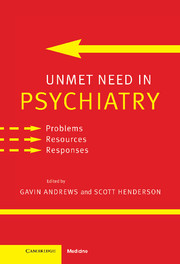Book contents
- Frontmatter
- Contents
- List of Contributors
- Preface
- Part I Unmet need: defining the problem
- Part II Unmet need: general problems and solutions
- Part III Unmet need: people with specific disorders
- Part IV Unmet need: specific issues
- Introduction
- 22 Unmet need in mental health service delivery: children and adolescents
- 23 Assessing psychopathology among children aged four to eight
- 24 Unmet need in Indigenous mental health: where to start?
- 25 Health systems research: a pragmatic model for meeting mental health needs in low-income countries
- 26 Disablement associated with chronic psychosis as seen by two groups of key informants: patients and mental health professionals
- 27 The assessment of perceived need
- 28 Public knowledge of and attitudes to mental disorders: a limiting factor in the optimal use of treatment services
- Part V Unmet need: conclusion
- Index
24 - Unmet need in Indigenous mental health: where to start?
from Part IV - Unmet need: specific issues
Published online by Cambridge University Press: 21 August 2009
- Frontmatter
- Contents
- List of Contributors
- Preface
- Part I Unmet need: defining the problem
- Part II Unmet need: general problems and solutions
- Part III Unmet need: people with specific disorders
- Part IV Unmet need: specific issues
- Introduction
- 22 Unmet need in mental health service delivery: children and adolescents
- 23 Assessing psychopathology among children aged four to eight
- 24 Unmet need in Indigenous mental health: where to start?
- 25 Health systems research: a pragmatic model for meeting mental health needs in low-income countries
- 26 Disablement associated with chronic psychosis as seen by two groups of key informants: patients and mental health professionals
- 27 The assessment of perceived need
- 28 Public knowledge of and attitudes to mental disorders: a limiting factor in the optimal use of treatment services
- Part V Unmet need: conclusion
- Index
Summary
Aborigines and Torres Strait Islanders are the most disadvantaged distinct population in Australia. In terms of health status they fare worse, not only by comparison with nonIndigenous Australians, but also when compared to Indigenous populations in similar situations elsewhere. The social justice issues underlying Indigenous ill-health and the consequences for Aboriginal and Torres Strait Islander mental health are emphasized in this chapter. While they are clearly a population with significant unmet mental health needs, health planners are pulled between two fundamental demands. On the one hand is the imperative to address underlying social justice issues. On the other is the pressing need for programs and services to address problems that, in some instances (such as Indigenous suicide), are increasing alarmingly.
Big brown eyes, little dark Australian boy
Playing with a broken toy.
This environment his alone,
This is where a seed is sown.
Can this child at the age of three
Rise above this poverty?
The walls all cracked and faded, bare.
The glassless window stare and stare
Like the half-dead eyes of a dying race
A sad but strange, compelling place.
(Davis, 1988)In his poem, ‘Slum Dwelling’, Jack Davis poses a question that should be considered by all Australians as an issue not only of social justice but national social responsibility. It is now 30 years since the Commonwealth Referendum of 1967 which provided for de facto ‘citizenship’ by including Aborigines and Torres Strait Islanders in national census enumerations and allowing for the Commonwealth to legislate in Aboriginal affairs. Unfortunately, much of the Indigenous optimism of those heady days of protest and planning has evaporated in the face of persistent disadvantage.
Keywords
- Type
- Chapter
- Information
- Unmet Need in PsychiatryProblems, Resources, Responses, pp. 356 - 362Publisher: Cambridge University PressPrint publication year: 2000
- 5
- Cited by



